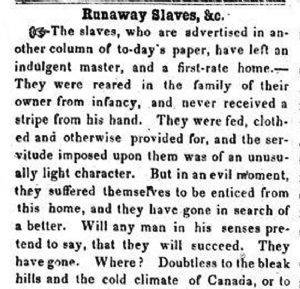Collection Name
About
Runaway Slaves, &c.
The slaves, who are advertised in another column of to-day's paper, have left an indulgent master, and a first-rate home.— They were reared in the family of their owner from infancy, and never received a stripe from his hand. They were fed, clothed and otherwise provided for, and the servitude imposed upon them was of an unusually light character. But in an evil moment, they suffered themselves to be enticed from this home, and they have gone in search of a better. Will any man in his senses pretend to say, that they will succeed. They have gone. Where ? Doubtless to the bleak hills and the cold climate of Canada, or to the purlieus of some large city or town in this country, to drag out a miserable existence among the hordes of debased and squalid creatures who infect those places, and furnish the Penitentiaries and Almshouses with their annual compliment of inmates, or the Pestilence with its first victims.
This is not an overwrought picture of the condition of the runaway slave among the Abolitionists. It is drawn from observation, and from conversations with Northern men, and, as "face answers to face in water," is true to the life in nine cases out of ten.— The Abolitionists see it; they have it before their eyes daily, and yet they will steal a slave from the home of his childhood, and then with blasphemous hypocrisy appeal to a "higher law," or a higher power, for the rectitude of their course. And they will babble for hours in the pulpit or upon the Rostrum, or fill columns of their incendiary publications with pathetic essays, about the galling fetters and the excoriating lash, which they falsely and maliciously assert arc applied to the limbs and the back of the enslaved African, while they suffer him, when he has attained his freedom, to perish at their doors from hunger or cold, or pursue him with the law’s direst vengeance, if be should extend the latitude of his newly acquired rights to their larders or hen roosts.
